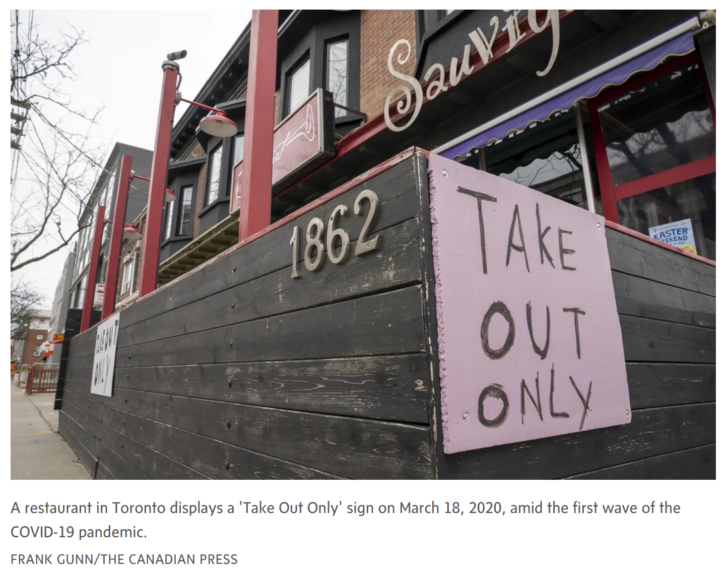As restaurants in Ontario prepare to reopen from the fifth wave of the pandemic, business owners say they’re going to be more cautious this time by bringing in measures such as smaller menus and limited operating hours to ensure they don’t suffer large losses in the case of another lockdown.
Restaurant owners say the memory of being ordered to shut down less than two weeks after reopening last year is still fresh in their minds.
“The piece that everyone has learnt is that when you go guns blazing right out of the gate and then you shut down again, there’s a cost associated with that,” said Court Desautels, chief executive officer of Neighbourhood Group, which operates multiple restaurants in the Guelph and Kitchener areas. He said the company will cut the beer menu to 13 varieties from 26 at one of its pubs to play it safe, for example.
“It’s not just labour costs, but product costs, and that’s one of the things we’re navigating during this lockdown. … We had an incredible amount of product brought in for the holidays for things like wine and beer, so now we’re going to try and whittle that down.”

Even as restaurant businesses across Ontario try to get excited about the reopening on Jan. 31, many say they’re feeling defeated. Just a few months ago in the summer and early fall, many business owners were starting to believe lockdowns could be over for good, and were crushed when the Omicron variant of COVID-19 turned their industry upside down again. Now, in addition to new pandemic restrictions, restaurants will have to deal with worsening staff shortages and inflation as they reopen.
The new restrictions will allow restaurants to operate at 50-per-cent capacity, as Ontario Premier Doug Ford said last week that the worst of the Omicron wave was over and there was a “light at the end of the tunnel.”
Hourly workers at restaurants say coming back to work feels a little different this time, as daily COVID-19 case counts and hospitalization numbers remain high.
Michaela Macht, a supervisor at Miijidaa Café and Bistro in Guelph, which is operated by Neighbourhood Group, said everyone around her knows somebody who’s caught the Omicron variant in the past couple of months, and there are some concerns about it among people in the workplace.
“I’ve kind of been back and forth, I’m like, ‘Oh yeah, everybody’s gonna get it,’ but then it’s like I haven’t yet, so maybe I won’t,” said Ms. Macht, who has worked as a server throughout the pandemic before recently becoming a supervisor.
“This round definitely felt different, though. I think a lot of people have had the experience where they know others who have gotten it.”
She said most staff at her restaurant who have other jobs decided not to come back to the restaurant, either to avoid the novel coronavirus or to allow other workers more hours after missing out on the lucrative holiday season.
But there is a sense of excitement for the workers who have stuck with the company this long, she said.
“Everybody is excited to come back to work and be able to go out to restaurants again,” Ms. Macht said. “Over all, this is a pretty positive move and people are feeling good about seeing others again and being able to work and make money.”
Restaurants Canada, an industry association that represents restaurants across the country, said spirits in the industry were at their lowest point after the latest month-long lockdown was announced.
“The last lockdown had more of an emotional impact,” said James Rilett, the association’s vice-president of Central Canada. “They were hoping they were at the end of this and didn’t know how much longer they could stay on the roller coaster.”
He said each lockdown has had compounding effects on the work force, as more servers, cooks and other staff give up on the industry and move on to other fields.
Based on a survey of restaurant suppliers, Restaurants Canada estimated around 10 per cent of restaurants across Ontario had shut down as of summer 2021. After the latest lockdown, Mr. Rilett said he estimates 12 per cent or 13 per cent of restaurants have now shut down.
Some business owners say making customers feel safe is one of their top priorities this time around, especially since Omicron cases are still relatively high.
Amalan Vijeyaratnam, general manager at Allen’s in Toronto’s Danforth neighbourhood, said all his staff have the booster shot, and there’s still an emphasis on contact tracing and strict adherence to physical-distancing rules at the restaurant.
“We have a lot of older customers come in that have repeatedly told us they like the way we do things, and that we’re always checking for vaccinations and getting contact tracing information,” Mr. Vijeyaratnam said, adding that people will complain about other establishments in the city that take a more relaxed approach.
“For us, we’re not as fearful of losing our customer base because we’ve done our best to follow the proper protocols, and that makes the staff and customers feel comfortable.”
Article From: Globe and Mail
Author: SALMAAN FAROOQUI

